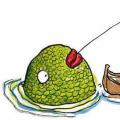Frost and sun; wonderful day! You are still dozing, lovely friend - It’s time, beauty, wake up: Open your eyes closed with bliss Towards the northern Aurora, Appear as the Star of the North! In the evening, do you remember, the blizzard was angry, there was darkness in the cloudy sky; The moon, like a pale spot, turned yellow through the gloomy clouds, And you sat sad - And now... look out the window: Under the blue skies Magnificent carpets, Glistening in the sun, the snow lies; The transparent forest alone turns black, And the spruce turns green through the frost, And the river glitters under the ice. The whole room is illuminated with an amber shine. The flooded stove crackles with a cheerful sound. It's nice to think by the bed. But you know: shouldn’t we tell the brown filly to be banned from the sled? Sliding through the morning snow, dear friend, let us indulge in the running of the impatient horse and visit the empty fields, the forests that were recently so dense, and the shore that is dear to me.
“Winter Morning” is one of Pushkin’s brightest and most joyful works. The poem is written in iambic tetrameter, which Pushkin resorted to quite often in those cases when he wanted to give his poems special sophistication and lightness.
From the first lines, the duet of frost and sun creates an unusually festive and optimistic mood. To enhance the effect, the poet builds his work on contrast, mentioning that just yesterday “the blizzard was angry” and “darkness rushed across the cloudy sky.” Perhaps each of us is very familiar with such metamorphoses, when in the midst of winter endless snowfalls are replaced by a sunny and clear morning filled with silence and inexplicable beauty.
On days like these, it’s simply a sin to sit at home, no matter how comfortably the fire crackles in the fireplace. Especially if outside the window there are amazingly beautiful landscapes - a river glistening under the ice, forests and meadows dusted with snow, which resemble a snow-white blanket woven by someone’s skillful hand.
Each line of the verse is literally permeated with freshness and purity, as well as admiration and admiration for the beauty of his native land, which never ceases to amaze the poet at any time of the year. There is no pretentiousness or restraint in the verse, but at the same time, each line is imbued with warmth, grace and harmony. In addition, simple joys in the form of a sleigh ride bring true happiness and help to fully experience the greatness of Russian nature, changeable, luxurious and unpredictable. Even in the contrasting description of bad weather, which is intended to emphasize the freshness and brightness of a sunny winter morning, there is no usual concentration of colors: a snow storm is presented as a fleeting phenomenon that is not able to darken the expectations of a new day filled with majestic calm.
At the same time, the author himself never ceases to be amazed at such dramatic changes that occurred in just one night. It’s as if nature itself acted as the tamer of an insidious blizzard, forcing her to change her anger to mercy and, thereby, giving people an amazingly beautiful morning, filled with frosty freshness, the creaking of fluffy snow, the ringing silence of silent snowy plains and the charm of the sun’s rays shimmering with all colors rainbows in frosty window patterns.
16 396 0
Reading the first stanza:
Frost and sun; wonderful day!
You are still dozing, dear friend -
It's time, beauty, wake up:
Open your closed eyes
Towards northern Aurora,
Be the star of the north!
Let's pay attention to lines 4-6. They contain not only "dark" words, although their obscurity may not be noticed, but also two now outdated archaic facts of grammar. Firstly, aren’t we surprised by the phrase “open your eyes”? After all, now you can only cast your gaze, direct your gaze, lower your gaze, but not open it. Here the noun gazes has the old meaning of “eyes.” The word gaze with this meaning is found in artistic speech first half of the 19th century centuries constantly. The participle “closed” is of unconditional interest here. Short Communion, as you know, is always a predicate in a sentence. But then, where is the subject to which it refers? In meaning, the word closed clearly gravitates towards the noun gazes, but it is (open what?) an undoubted direct object. This means “closed” is the definition of the word “gaze”.
But why then are they closed and not closed? Before us is the so-called truncated participle, which, like the truncated adjective, was one of the favorite poetic liberties of poets of the 18th - first half of the 19th centuries.
Now let's touch on one more word in this line. This is the noun "bliss". It is also not without interest. In S.I. Ozhegov’s dictionary it is interpreted: “Nega - i.zh. (obsolete) 1. Complete contentment. Live in bliss. 2. Bliss, a pleasant state. Indulge in bliss."
“The Dictionary of Pushkin’s Language” notes along with this following values: “A state of serene peace” and “sensual intoxication, pleasure.” The word bliss does not correspond to the listed meanings in the poem in question. In this case, it is best translated into modern Russian by the word sleep, since sleep is the most complete “state of serene peace.”
Let's go down a line below. Here, too, linguistic facts await us that require clarification. There are two of them. Firstly, this is the word Aurora. As a proper name, it begins with a capital letter, but in its meaning it acts here as a common noun: the Latin name of the goddess of the morning dawn names the morning dawn itself. Secondly, its grammatical form. Indeed, now after the preposition towards, the dative case of the noun follows and, according to modern rules, it should be “Towards northern Aurora”. And the genitive case is Aurora. This is not a typo or an error, but a now obsolete archaic form. Previously, the preposition towards required after itself a noun in the form genitive case. For Pushkin and his contemporaries this was the norm.
Let's say a few words about the phrase “Appear as a star of the north.” The word star (of the north) here means the most worthy woman in St. Petersburg, and is not used in its literal meaning - a celestial body.
Second stanza
In the evening, do you remember, the blizzard was angry,
There was darkness in the cloudy sky;
The moon is like a pale spot
Through the dark clouds it turned yellow,
And you sat sad -
And now... look out the window:
Here we will pay attention to the words evening and darkness. We know that the word vecher means yesterday evening. In common usage, the word haze now means darkness, gloom. The poet uses this word to mean “thick snow, hiding everything around in the fog, like a kind of curtain.”
Third stanza
Under blue skies
Magnificent carpets,
Glistening in the sun, the snow lies;
The transparent forest alone turns black,
And the spruce turns green through the frost,
And the river glitters under the ice.
The third stanza of the poem is distinguished by its linguistic transparency. There is nothing out-of-date about it, and it does not need any explanation.
4th and 5th stanzas
The whole room has an amber shine
Illuminated. Cheerful crackling
The flooded stove crackles.
It's nice to think by the bed.
But you know: shouldn’t I tell you to get into the sleigh?
Ban the brown filly?
Sliding on the morning snow,
Dear friend, let's indulge in running
impatient horse
And we'll visit the empty fields,
The forests, recently so dense,
And the shore, dear to me.
There are linguistic “peculiarities” here. Here the poet says: “It’s nice to think by the couch.”
Analysis of incomprehensible words and expressions
Here the poet says: “It’s nice to think by the couch.” Do you understand this proposal? It turns out not. The word bed is bothering us here. A lounger is a low (at the level of a modern bed) ledge near a Russian stove, on which, while warming up, they rested or slept.
At the very end of this stanza, the word ban sounds strange and unusual instead of the normative, correct modern harness from the verb harness. At the time, both forms existed on equal terms, and, undoubtedly, the form “to ban” appeared here in Pushkin for rhyming as a fact of poetic license, which was determined by the word stove that stood above.
“Winter Morning” Alexander Pushkin
Frost and sun; wonderful day!
You are still dozing, dear friend -
It's time, beauty, wake up:
Open your closed eyes
Towards northern Aurora,
Be the star of the north!In the evening, do you remember, the blizzard was angry,
There was darkness in the cloudy sky;
The moon is like a pale spot
Through the dark clouds it turned yellow,
And you sat sad -
And now... look out the window:Under blue skies
Magnificent carpets,
Glistening in the sun, the snow lies;
The transparent forest alone turns black,
And the spruce turns green through the frost,
And the river glitters under the ice.The whole room has an amber shine
Illuminated. Cheerful crackling
The flooded stove crackles.
It's nice to think by the bed.
But you know: shouldn’t I tell you to get into the sleigh?
Ban the brown filly?Sliding on the morning snow,
Dear friend, let's indulge in running
impatient horse
And we'll visit the empty fields,
The forests, recently so dense,
And the shore, dear to me.
Analysis of Pushkin's poem "Winter Morning"
Lyrical works occupy a very significant place in the work of Alexander Pushkin. The poet has repeatedly admitted that he is in awe not only of the traditions, myths and legends of his people, but also never ceases to admire the beauty of Russian nature, bright, colorful and full of mysterious magic. He made many attempts to capture a wide variety of moments, masterfully creating images of an autumn forest or a summer meadow. However, the poem “Winter Morning”, created in 1829, is rightfully considered one of the most successful, bright and joyful works of the poet.
From the very first lines, Alexander Pushkin puts the reader in a romantic mood, in a few simple and elegant phrases describing the beauty of winter nature, when the duet of frost and sun creates an unusually festive and optimistic mood. To enhance the effect, the poet builds his work on contrast, mentioning that just yesterday “the blizzard was angry” and “darkness rushed across the cloudy sky.” Perhaps each of us is very familiar with such metamorphoses, when in the midst of winter endless snowfalls are replaced by a sunny and clear morning filled with silence and inexplicable beauty.
On days like these, it’s simply a sin to sit at home, no matter how comfortably the fire crackles in the fireplace. And in every line of Pushkin’s “Winter Morning” there is a call to go for a walk, which promises a lot unforgettable impressions. Especially if outside the window there are amazingly beautiful landscapes - a river glistening under the ice, forests and meadows dusted with snow, which resemble a snow-white blanket woven by someone’s skillful hand.
Every line of this poem is literally permeated with freshness and purity., as well as admiration and admiration for the beauty of his native land, which at any time of the year never ceases to amaze the poet. Moreover, Alexander Pushkin does not seek to hide his overwhelming feelings, as many of his fellow writers did in the 19th century. Therefore, in the poem “Winter Morning” there is no pretentiousness and restraint inherent in other authors, but at the same time, each line is imbued with warmth, grace and harmony. In addition, simple joys in the form of a sleigh ride give the poet true happiness and help him fully experience the greatness of Russian nature, changeable, luxurious and unpredictable.
The poem “Winter Morning” by Alexander Pushkin is rightfully considered one of the most beautiful and sublime works of the poet. It lacks the causticity so characteristic of the author, and there is no usual allegory, which makes you look for the hidden meaning in every line. These works are the embodiment of tenderness, light and beauty. Therefore, it is not surprising that it is written in light and melodic iambic tetrameter, to which Pushkin resorted quite often in those cases when he wanted to give his poems special sophistication and lightness. Even in the contrasting description of bad weather, which is intended to emphasize the freshness and brightness of a sunny winter morning, there is no usual concentration of colors: a snow storm is presented as a fleeting phenomenon that is not able to darken the expectations of a new day filled with majestic calm.
At the same time, the author himself never ceases to be amazed at such dramatic changes that occurred in just one night. It’s as if nature itself acted as the tamer of an insidious blizzard, forcing her to change her anger to mercy and, thereby, giving people an amazingly beautiful morning, filled with frosty freshness, the creaking of fluffy snow, the ringing silence of silent snowy plains and the charm of the sun’s rays shimmering with all colors rainbows in frosty window patterns.
Poem “Winter Morning” by A.S. Pushkin was written by him during one of the most fruitful creative periods - during his exile in Mikhailovskoye. But on the day when this poetic work was born, the poet was not on his estate - he was visiting friends, the Wulf family, in the Tver province. When starting to read the poem “Winter Morning” by Pushkin, it is worth remembering that it was written in one day, and not a single edit was made to the text. One can only marvel at the talent of the creator, who was able to so quickly embody his own mood, the beauty of Russian nature, and reflections on life in magnificent landscape lyrics. This work is rightfully one of the most famous in Pushkin’s work.
Several important themes are clearly visible in the poem “Winter Morning”. The main and most obvious is the theme of love. In each line one can feel the poet’s tenderness addressed to his beloved, one can feel his reverent attitude towards her, the inspiration that gives him the feeling. His beloved is a lovely child of nature, and this is sweet to him and causes deep heartfelt feelings. Another topic is reflections on the birth of a new day, which erases all previous sorrows and makes the world more beautiful and more fun. Despite the fact that the evening was sad, today the sun illuminates everything around, and its light gives the most important thing - hope. In addition, Alexander Sergeevich uses the landscape not just as an artistic device to personify his own thoughts and not only as a symbol of a new beginning - the beautiful Russian nature is also the theme of his poem, which can be downloaded to slowly enjoy each line. And finally, the general idea of the entire work is the unity of man and nature in the general philosophical sense.
The general mood that can be felt in the text of Pushkin’s poem “Winter Morning,” which can be read online for free to feel the joy of life, is optimistic, because it tells that any storm is not eternal, and after it, when a bright streak comes, life is still more wonderful. Even the stanzas that talk about evening sadness seem to be full of joyful anticipation of the morning. And when it comes, the joy becomes complete, because everything around, every snowflake illuminated by the winter sun, is so beautiful! This is a cheerful and cheerful work - it seems that the poet forgot both about exile and loneliness, admiring his sleeping beloved and native nature. Reading this poem fills the soul with positive emotions, reminds us of how beautiful the world is and how important it is to love our native nature.
Frost and sun; wonderful day!
You are still dozing, dear friend -
It's time, beauty, wake up:
Open your closed eyes
Towards northern Aurora,
Be the star of the north!
In the evening, do you remember, the blizzard was angry,
There was darkness in the cloudy sky;
The moon is like a pale spot
Through the dark clouds it turned yellow,
And you sat sad -
And now... look out the window:
Under blue skies
Magnificent carpets,
Glistening in the sun, the snow lies;
The transparent forest alone turns black,
And the spruce turns green through the frost,
And the river glitters under the ice.
The whole room has an amber shine
Illuminated. Cheerful crackling
The flooded stove crackles.
It's nice to think by the bed.
But you know: shouldn’t I tell you to get into the sleigh?
Ban the brown filly?
Sliding on the morning snow,
Dear friend, let's indulge in running
impatient horse
And we'll visit the empty fields,
The forests, recently so dense,
And the shore, dear to me.
Frost and sun; wonderful day!
You are still dozing, dear friend -
It's time, beauty, wake up:
Open your closed eyes
Towards northern Aurora,
Be the star of the north!
In the evening, do you remember, the blizzard was angry,
There was darkness in the cloudy sky;
The moon is like a pale spot
Through the dark clouds it turned yellow,
And you sat sad -
And now... look out the window:
Under blue skies
Magnificent carpets,
Glistening in the sun, the snow lies;
The transparent forest alone turns black,
And the spruce turns green through the frost,
And the river glitters under the ice.
The whole room has an amber shine
Illuminated. Cheerful crackling
The flooded stove crackles.
It's nice to think by the bed.
But you know: shouldn’t I tell you to get into the sleigh?
Ban the brown filly?
Sliding on the morning snow,
Dear friend, let's indulge in running
impatient horse
And we'll visit the empty fields,
The forests, recently so dense,
And the shore, dear to me.
Analysis of the poem “Winter Morning” by Pushkin
The poem “Winter Morning” is a brilliant lyrical work by Pushkin. It was written in 1829, when the poet had already been released from exile.
“Winter Morning” refers to the poet’s works dedicated to the quiet idyll of village life. The poet always treated the Russian people and Russian nature with deep trepidation. Love for the Motherland and native language was Pushkin’s innate quality. He conveyed this feeling with great skill in his works.
The poem begins with a line known to almost everyone: “Frost and sun; wonderful day!” From the first lines, the author creates a magical picture of a clear winter day. The lyrical hero greets his beloved - “adorable friend.” The amazing transformation of nature that took place overnight is revealed through a sharp contrast: “the blizzard was angry”, “the darkness was rushing” - “the spruce is turning green”, “the river is shining”. Changes in nature, according to the poet, will definitely affect a person’s mood. He invites his “sad beauty” to look out the window and feel the splendor of the morning landscape.
Pushkin liked to live in the village, away from the noisy bustle of the city. He describes the simple everyday joys. A person needs little to be happy: a cozy house with a hot stove and the presence of his beloved woman. A sleigh ride can be a particular pleasure. The poet strives to admire the fields and forests so dear to him, to evaluate the changes that have occurred to them. The charm of a walk is given by the presence of a “dear friend” with whom you can share your joy and delight.
Pushkin is considered one of the founders of the modern Russian language. “Winter Morning” is one of the small but important building blocks in this matter. The poem is written in simple and understandable language. Iambic tetrameter, which the poet loved so much, is ideal for describing the beauty of the landscape. The work is imbued with extraordinary purity and clarity. Main expressive means are numerous epithets. The past sad day includes: “cloudy”, “pale”, “gloomy”. A real joyful day is “magnificent”, “transparent”, “amber”. The central comparison of the poem is dedicated to the beloved woman - the “star of the north.”
There is no hidden philosophical meaning in the poem, no omissions or allegories. Not using beautiful phrases and expressions, Pushkin painted a magnificent picture that cannot leave anyone indifferent.




